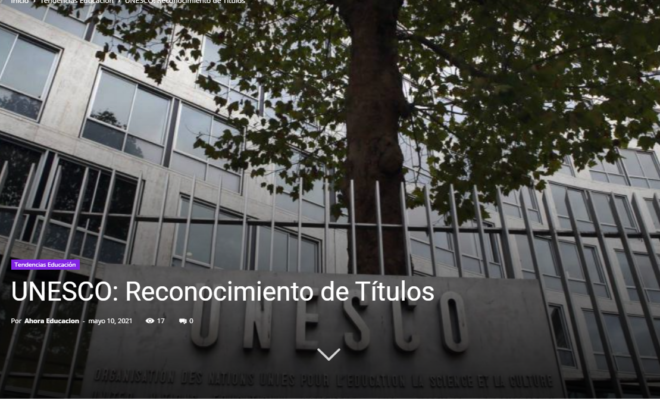Why is a Regional Convention for the recognition of higher education is necessary?

When a student decides to leave his/her country to study in a higher education institution in another country, he/she is looking to complement and improve his/her learning experience, expand knowledge, learn another language, be exposed to different cultures, in search of a better future. Some decide to migrate permanently and the majority of the others either return home or end up in a third country; in any event, any of these decisions depends on whether the studies are recognized by the State or the higher education institutions, in the country of origin or any other destination.
Despite the explosive expansion in student international mobility throughout the world (between 4 – 5 million in 5 years, between 2012 and 2017), this is not the case for Latin America and the Caribbean (LAC). Statisitics show that of the 312,000 students who left one country in LAC to study abroad, only 120,000 went to another country in the región. In other words, more than half of them chose countries outside of LAC for their destination, according to the Report “Higher education mobility in Latin America and the Caribbean: challenges and opportunities of a Renewed Convention for the recognition of studies, degrees and diplomas (UNESCO-IESALC, 2019).
The fact that there was no legal framework for the recognition of studies for academic mobility could be one of the reasons why the region is not attractive internationally as an academic destination. This is why higher education institutions and States must guarantee that degrees issued are recognized in other countries, including the country of origin; ensure access to information on higher education systems and facilitate timely assessment of degrees.
What is the New Buenos Aires 2019 Convention for Recognition?
UNESCO proposed the creation of an instrument invoking Member States to take the necessary measures for those receiving a degree in another country to be entitled to a fair, transparent and non-discriminatory assessment of their studies.
To this end, the International Conference of States was held in the city of Buenos Aires, Argentina was held June 11-19, 2019 to approve the 2019 Regional Convention for the Recognition of Studies, Degrees and Diplomas in Higher Education in Latin America and the Caribbean. Argentina, Bahamas, Belice, Bolivia, Brasil, Chile, Colombia, Costa Rica, Cuba, Dominican Republic, Ecuador, El Salvador, Granada, Honduras, Jamaica, México, Nicaragua, Panamá, Paraguay, Perú, Saint Kitts y Nevis, Uruguay and Venezuela were signatories. The Convention entered into force following its ratification by four (4) Member States.
What are the benefits of the New Buenos Aires 2019 Convention for students, faculty and States in the region?
• It provides a mechanism for countries in Latin America and the Caribbean to facilitate recognition of higher education qualifications on the basic principles of greater information and transparency.
• It makes student and faculty mobility more attractive as an opportunity to upgrade their learning, acquire skills and knowledge in an international environment, which in turn impacts on the productivity and social transformation of their societies.
• It guarantees efficient, transparent, accessible and effective mobility.
• It contributes to the establishment of equitable, symmetrical and important regional integration, based on solidary academic cooperation.
• It offers transparent and updated information on institutions, curricular content and performance profile, which inspires confidence among higher education actors.
How will UNESCO-IESALC contribute to achieving the ratification of the Buenos Aires Convention 2019?
The UNESCO International Institute for Higher Education in Latin America and the Caribbean (UNESCO-IESALC) has defined a strategy for the ratification of the New Convention by the end of the UNESCO Biennium for Higher Education in Latin America and the Caribbean (UNESCO-IESALC) and its contribution to greater cooperation among the higher education systems in the region, and capacity building for the preparation of further developments related to the New Convention.
The strategy considers the following actions: the provision of technical assistance to the Ministries of Higher Education or their equivalent agencies; development of the tools required for the operationalization of the Convention and the establishment of alliances for the sharing of experiences and good practice.
How does the New Buenos Aires Convention relate to the Global Convention?
The Buenos Aires Convention “will be implemented in synergy with the Global Convention on the Recognition of Higher Education Qualifications to be presented for adoption at the 40th Session of the General Conference”. The new global convention will be the first normative instrument for recognition at a global level and will not replace nor substitute any other existing bilateral or multilateral convention for recognition.
Photo courtesy of Quora
RELATED ITEMS







